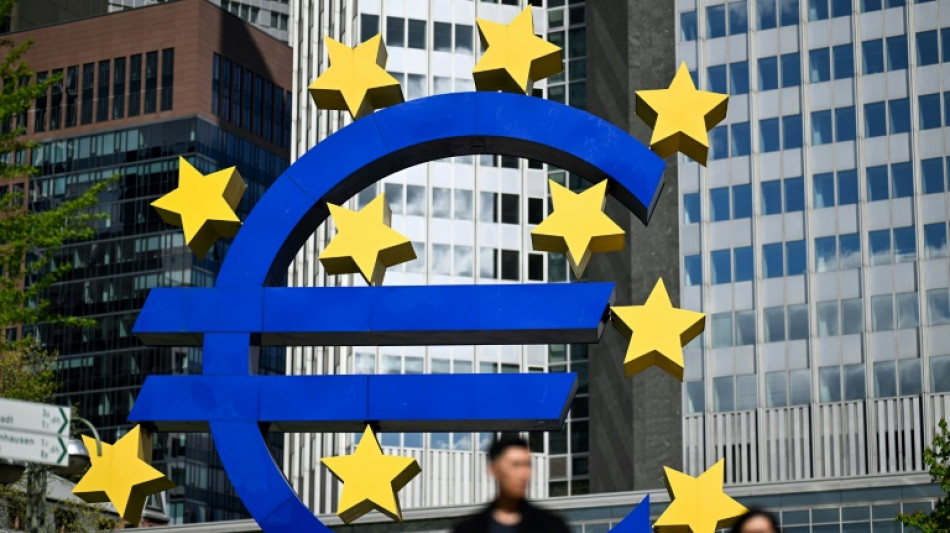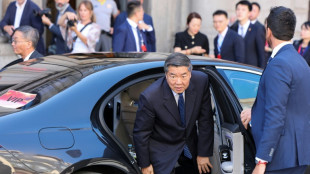
-
 Television stars shine bright on Emmys red carpet
Television stars shine bright on Emmys red carpet
-
'The Studio' claims early win as TV's Emmys kick off

-
 Japan rips Tonga to reach Pacific Nations Cup rugby final
Japan rips Tonga to reach Pacific Nations Cup rugby final
-
Australia's ANZ bank hit with record fine over 'widespread misconduct'

-
 Eagles top Chiefs in Super Bowl rematch as Cowboys edge Giants in NFL thriller
Eagles top Chiefs in Super Bowl rematch as Cowboys edge Giants in NFL thriller
-
Seattle's Raleigh hits 54th homer of season for MLB marks

-
 NFL Cowboys top Giants in overtime while Lions maul Bears
NFL Cowboys top Giants in overtime while Lions maul Bears
-
Trump concerned S. Korean arrests could 'frighten' investors

-
 Timeless Modric opens AC Milan account with winner against Bologna
Timeless Modric opens AC Milan account with winner against Bologna
-
Spring quick-fire hat-trick helps Racing stun Bordeaux-Begles

-
 Macau's first 'patriots' election sees low turnout
Macau's first 'patriots' election sees low turnout
-
Prince Harry says has 'clear conscience' over explosive memoir

-
 Modric opens AC Milan account with winner against Bologna
Modric opens AC Milan account with winner against Bologna
-
Schroeder seals Euro basketball title for world champions Germany

-
 Hull wins LPGA Queen City title after Jeeno four-putt bogey at 18
Hull wins LPGA Queen City title after Jeeno four-putt bogey at 18
-
Spain's political class spars over chaotic Vuelta finale

-
 Top four into Women's Rugby World Cup semi-finals as France edge Ireland
Top four into Women's Rugby World Cup semi-finals as France edge Ireland
-
Two ships set sail from Greece to join Gaza aid flotilla

-
 Amorim won't change despite 'suffering' in dismal Man Utd run
Amorim won't change despite 'suffering' in dismal Man Utd run
-
Australia stunned by Belgium, joining USA on Davis Cup scrapheap

-
 Spinners power India to win over Pakistan in Asia Cup
Spinners power India to win over Pakistan in Asia Cup
-
Bolsonaro conviction 'not a witch hunt,' Lula tells Trump in NYT op-ed

-
 'Demon Slayer' tops N.America box office with record anime opening
'Demon Slayer' tops N.America box office with record anime opening
-
Tens of thousands join Ankara protest ahead of court showdown

-
 Haaland-inspired Man City inflict derby demolition on Man Utd
Haaland-inspired Man City inflict derby demolition on Man Utd
-
Vuelta triumph caps Vingegaard's fight back from the brink

-
 French runner Gressier thanks anti-doping body for his world title
French runner Gressier thanks anti-doping body for his world title
-
Romania summons Russian ambassador over drone 'threat'

-
 'Palestine wins the Vuelta': Gaza demo halts cycling finale in Madrid
'Palestine wins the Vuelta': Gaza demo halts cycling finale in Madrid
-
Vuelta final stage abandoned due to pro-Palestinian protest, Vingegaard crowned

-
 PSG maintain perfect start to Ligue 1, Ethan Mbappe strikes late for Lille
PSG maintain perfect start to Ligue 1, Ethan Mbappe strikes late for Lille
-
Alleged Kirk killer had 'leftist' beliefs, Utah governor says

-
 Shakespeare family tragedy 'Hamnet' wins top Toronto film prize
Shakespeare family tragedy 'Hamnet' wins top Toronto film prize
-
Record-breaking England crush Scotland to reach Women's Rugby World Cup semi-finals

-
 Noren upstages Ryder Cup stars to win PGA Championship at Wentworth
Noren upstages Ryder Cup stars to win PGA Championship at Wentworth
-
Lookman to miss Atalanta's Champions League opener at PSG, says Juric

-
 Fraser-Pryce, Jamaica's sprint warrior queen
Fraser-Pryce, Jamaica's sprint warrior queen
-
Vuelta final stage abandoned amid huge pro-Palestinian protest

-
 India limit Pakistan to 127-9 in key Asia Cup T20 clash
India limit Pakistan to 127-9 in key Asia Cup T20 clash
-
Ethan Mbappe strikes late to give Lille win over Toulouse

-
 Fans set aside boycott calls to watch India-Pakistan cricket clash
Fans set aside boycott calls to watch India-Pakistan cricket clash
-
Rain denies England and South Africa a series decider

-
 Seville and Jefferson-Wooden enjoy maiden world titles, US savour field of gold
Seville and Jefferson-Wooden enjoy maiden world titles, US savour field of gold
-
Itoje to rehab with England as Farrell omitted from training squad

-
 Marc Marquez rolls out Messi-inspired celebration as seventh MotoGP title looms
Marc Marquez rolls out Messi-inspired celebration as seventh MotoGP title looms
-
Seville delighted to win world 100m title in front of Bolt

-
 Seville sparks Jamaican men's sprint renaissance
Seville sparks Jamaican men's sprint renaissance
-
Starmer says UK won't tolerate racial intimidation after far-right rally

-
 New round of US-China trade talks kicks off in Madrid
New round of US-China trade talks kicks off in Madrid
-
France edge Ireland in Women's Rugby World Cup quarter-final thriller


ECB's digital euro sparks flurry of online misinformation
European Central Bank president Christine Lagarde's recent remarks on a "digital euro" prompted a fresh wave of misinformation online, highlighting an uphill battle ahead to convince the public of the project's merits.
The decision to create a digital euro -- essentially an electronic form of cash backed by the ECB -- has not been made yet and any possible launch would be years away.
But when Lagarde in a press conference this month referenced an October 2025 deadline for moving to the next stage of preparations, social media lit up with alarmed messages that the launch was imminent.
Harald Vilimsky, a member of the European Parliament from Austria's far-right Freedom Party (FPOe), was among those posting that the ECB "wants to introduce the digital euro in October", an incorrect claim that spread in several languages.
The claim was echoed on X by Nicolas Dupont-Aignan, the eurosceptic head of the Rise Up France party, who added that the project was "madness for our freedoms".
Other widely shared posts repeated misconceptions that have long dogged the project: that a digital euro would mean the "end of cash" or be used for financial surveillance, allowing the ECB to "block" or "track" payments or "access savings".
"Your money will no longer be yours," alleged a French TikTok video shared more than 15,000 times.
The falsehoods circulating online reveal a broader "mistrust of centralised institutions", said Vicky Van Eyck, executive director of campaign group Positive Money Europe.
Recent comments by French President Emmanuel Macron and European Commission chief Ursula von der Leyen about investment needs were similarly misused in viral posts that falsely claimed people's savings would be taken from them.
- 'Strategic autonomy' -
The ECB and dozens of other central banks worldwide are exploring or putting in place central bank digital currencies (CBDCs) as cash use declines.
Conspiracy theories about governments planning cashless societies as way of controlling citizens have proliferated since the Covid-19 pandemic, but ECB officials have been at pains to stress that a digital euro would complement cash -- not replace it.
Issued by the ECB, the money would be risk-free. It would be held in a digital wallet and payments could be made online or offline, allowing for cash-like anonymity. The ECB says it would not be able to directly link transactions to specific individuals.
In making the case for a digital euro, the ECB argues that it would bolster Europe's "strategic autonomy".
A digital euro would allow for direct money transfers between users, offering a pan-European payment service that could reduce reliance on US payment giants such as Mastercard, Visa, Apple Pay or PayPal.
"This dependence exposes Europe to risks of economic pressure and coercion," ECB chief economist Philip Lane warned last week, in a nod to transatlantic tensions under US President Donald Trump.
Lane said a digital euro could also counter the influence of increasingly popular dollar-backed "stablecoins" -- private digital currencies that are pegged to the US dollar and could undermine the euro if widely adopted in Europe.
- Challenges -
Some observers remain critical.
Ignazio Angeloni, a former ECB official and currently a fellow at Milan's Bocconi University, said Europeans already had "a plethora" of easy payment options and weren't necessarily looking for another.
For now, the digital euro discussions were still at a fairly technical stage, Angeloni said, and many members of the public were "not interested".
Van Eyck said interest could be hindered by plans to cap how many digital euros consumers could hold.
An ECB report published in March found that between 2022 and 2024, awareness about the digital euro jumped from 18 to 40 percent among eurozone survey respondents. The potential willingness to use it remained below 50 percent.
The decision to issue a digital euro will only come once European Union legislation is in place, but progress in Brussels has been slow.
If adopted, a digital euro would be introduced from mid-2027 or 2028 at the earliest, officials told AFP.
Good communication with the public will be key to its success, said Van Eyck.
"The big issue with not having the public on board is that the digital euro could flop," she said.
L.Maurer--VB

